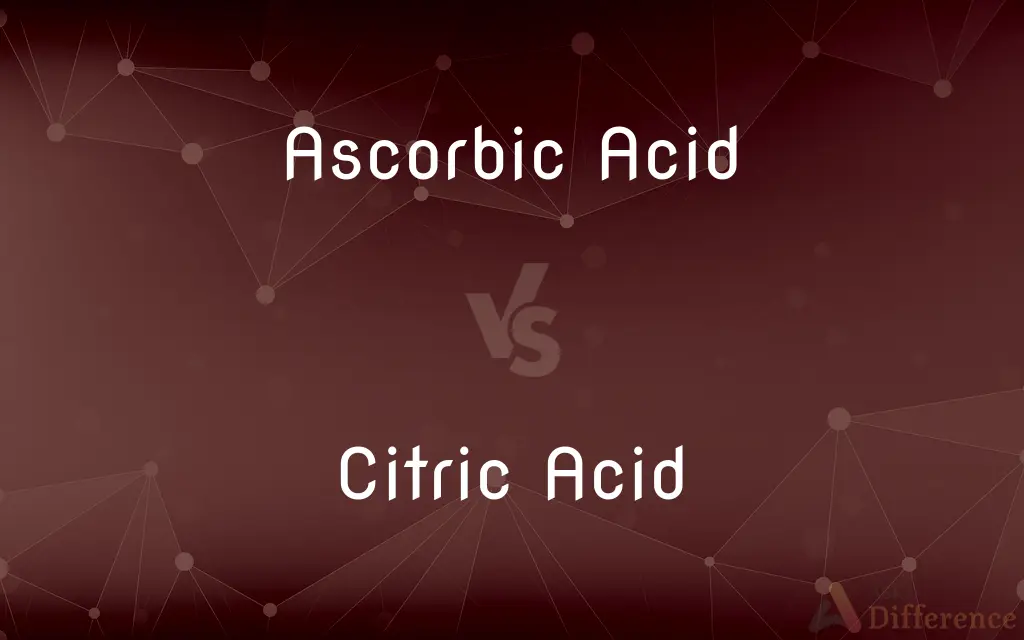Ascorbic Acid vs. Citric Acid — What's the Difference?
By Tayyaba Rehman — Published on October 7, 2023
Ascorbic acid, commonly known as vitamin C, is vital for immune function, while citric acid is an organic acid found primarily in citrus fruits, acting as a natural preservative and flavor enhancer.

Difference Between Ascorbic Acid and Citric Acid
Table of Contents
ADVERTISEMENT
Key Differences
Ascorbic acid and citric acid are both organic compounds, but they differ in their structures, functions, and sources. Ascorbic acid, widely known as vitamin C, is an essential vitamin for humans. It plays critical roles in collagen synthesis, antioxidant functions, and aids in the absorption of iron. Many consider ascorbic acid vital for skin health, wound healing, and overall immune function.
On the other hand, citric acid is a weak organic acid primarily found in citrus fruits like oranges, lemons, and limes. Unlike ascorbic acid, which serves primarily as a vitamin, citric acid is known for its flavor enhancing and preservative properties. It imparts a sour or tangy taste to foods and beverages. Moreover, citric acid is used in the preservation of a range of products due to its ability to chelate metals and function as an antioxidant.
From a chemical perspective, while both ascorbic acid and citric acid are acids, their structures and molecular compositions differ. Ascorbic acid possesses antioxidant properties, making it essential in defending the body against free radicals. Citric acid, in its turn, plays a key role in the citric acid cycle (Krebs cycle) in cellular respiration, facilitating energy production.
To sum up, while both ascorbic acid and citric acid are naturally occurring and beneficial organic compounds, they differ significantly in their functions, structures, and sources. It's crucial to note that they aren't interchangeable, despite sometimes being mentioned in similar contexts, especially in food and health.
Comparison Chart
Primary Function
Essential vitamin for immune function, collagen synthesis, etc.
Flavor enhancer, preservative, and component of the citric acid cycle.
ADVERTISEMENT
Main Sources
Fruits (especially citrus), vegetables, supplements
Primarily citrus fruits, also synthetically produced for industrial use.
Chemical Structure
Different molecular composition and structure.
Different molecular composition and structure.
Role in Metabolism
Acts as an antioxidant and aids in iron absorption.
Key component of the citric acid cycle in cellular respiration.
Compare with Definitions
Ascorbic Acid
An antioxidant that defends against free radicals.
Daily intake of ascorbic acid can boost immune defenses.
Citric Acid
A weak organic acid predominantly found in citrus fruits.
Lemons, being rich in citric acid, have a tangy flavor.
Ascorbic Acid
An essential vitamin for humans known as vitamin C.
Oranges are a rich source of ascorbic acid.
Citric Acid
A component crucial in the citric acid cycle for energy production.
The Krebs cycle relies on citric acid for cellular respiration.
Ascorbic Acid
A water-soluble vitamin crucial for overall health.
Ascorbic acid supplements are often recommended to prevent vitamin C deficiency.
Citric Acid
An acid used to chelate metals and function as an antioxidant.
Citric acid in shampoos helps in chelating and removing mineral buildup.
Ascorbic Acid
A vital component aiding in collagen synthesis and wound healing.
Applying ascorbic acid can help improve skin texture.
Citric Acid
A natural preservative and flavor enhancer in foods and drinks.
Citric acid gives sodas a sharp, refreshing taste.
Ascorbic Acid
A compound assisting in the absorption of iron from the digestive tract.
Pairing ascorbic acid with iron-rich foods can enhance iron uptake.
Citric Acid
A sour-tasting compound used in culinary and industrial applications.
Citric acid is often added to candies for a sour kick.
Common Curiosities
What is ascorbic acid commonly known as?
Ascorbic acid is commonly known as vitamin C.
Is ascorbic acid essential for human health?
Yes, ascorbic acid is an essential vitamin for human health, playing roles in immune function and collagen synthesis.
Where is citric acid mainly found?
Citric acid is mainly found in citrus fruits like lemons, oranges, and limes.
What are the primary functions of citric acid in foods?
Citric acid acts as a flavor enhancer, natural preservative, and can provide a sour or tangy taste.
Is citric acid involved in human metabolism?
Yes, citric acid plays a key role in the citric acid cycle (Krebs cycle) in cellular respiration.
Is citric acid safe for consumption?
Yes, citric acid is generally recognized as safe for consumption in moderate amounts.
Can ascorbic acid help with iron absorption?
Yes, ascorbic acid aids in the absorption of iron from the digestive tract.
Why is citric acid added to beverages?
Citric acid is added to beverages for its tangy flavor and preservative properties.
Can ascorbic acid deficiency lead to health issues?
Yes, deficiency in ascorbic acid can lead to scurvy and other health complications.
Are ascorbic acid and citric acid the same?
No, ascorbic acid and citric acid are different compounds with distinct functions and sources.
Share Your Discovery

Previous Comparison
Split AC vs. Window AC
Next Comparison
Eukaryotic Cell vs. Prokaryotic CellAuthor Spotlight
Written by
Tayyaba RehmanTayyaba Rehman is a distinguished writer, currently serving as a primary contributor to askdifference.com. As a researcher in semantics and etymology, Tayyaba's passion for the complexity of languages and their distinctions has found a perfect home on the platform. Tayyaba delves into the intricacies of language, distinguishing between commonly confused words and phrases, thereby providing clarity for readers worldwide.
















































